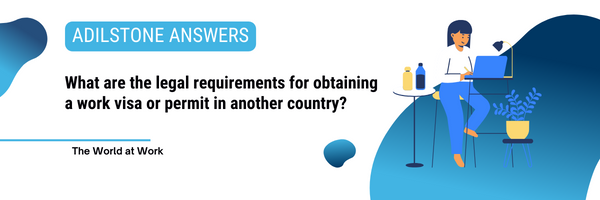What are the legal requirements for obtaining a work visa or permit? | Adilstone Answers
- See the World at Work What are the legal requirements for obtaining a work visa or permit? | Adilstone Answers

The legal requirements for obtaining a work visa or permit in a different country can vary significantly from one country to another. Each country has its own immigration laws and policies, and the requirements for obtaining a work visa or permit will depend on your nationality, the type of work you intend to do, and the specific country's regulations. However, there are some common steps and factors that are often involved in the process. Here is a general overview:
- Determine Your Eligibility: First, you need to determine if you are eligible to work in the country of your choice. Eligibility criteria can include factors such as your qualifications, skills, job offer, and the demand for workers in your field.
- Job Offer: In many cases, you will need a job offer from an employer in the country where you want to work. The employer may need to demonstrate that they were unable to find a suitable local candidate for the position.
- Choose the Right Visa/Permit: Different countries have various types of work visas or permits, each with its own requirements. You should identify the specific visa or permit category that matches your situation. Common categories include skilled worker visas, temporary work permits, and intra-company transfer visas.
- Gather Required Documents: Prepare all the necessary documents, which may include your passport, a valid job offer letter, proof of qualifications or professional certifications, medical exams, criminal background checks, and evidence of financial stability. Make sure all documents are translated if necessary and authenticated as required by the country's laws.
- Application Submission: Submit your application to the relevant government agency or embassy/consulate of the country where you intend to work. Pay any required application fees.
- Interview or Biometrics: Some countries may require you to attend an interview or provide biometric information (e.g., fingerprints) as part of the application process.
- Wait for Processing: The processing time for work visas or permits can vary widely, from a few weeks to several months. It's essential to apply well in advance of your planned start date.
- Medical Examinations: In some cases, you may need to undergo medical examinations to prove your fitness for the job or to meet health requirements set by the host country.
- Background Checks: Some countries may require background checks to ensure you have no criminal record or pose no security threat.
- Visa Issuance: If your application is approved, you will receive the work visa or permit. Make sure to review the terms and conditions attached to it.
- Travel and Arrival: Once you have your visa or permit, you can travel to the host country. Upon arrival, you may need to register with local authorities or immigration officials.
- Renewal and Compliance: Keep track of your visa or permit's expiration date and ensure that you comply with the host country's immigration laws and regulations. In many cases, work visas can be extended or renewed.
It's essential to check the specific requirements and procedures for the country where you plan to work, as they can change over time. Consult the official website of the country's immigration authority or contact their embassy or consulate for the most up-to-date information and guidance on obtaining a work visa or permit. Additionally, consider consulting with an immigration attorney or expert to navigate the process successfully.
What burning questions do you have? Let us know by commenting below and we'll answer your questions in our upcoming editions!
Related Content




Comments